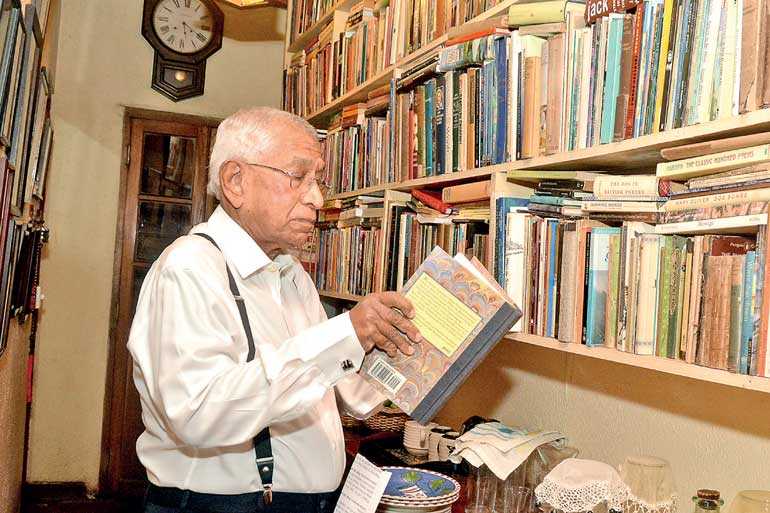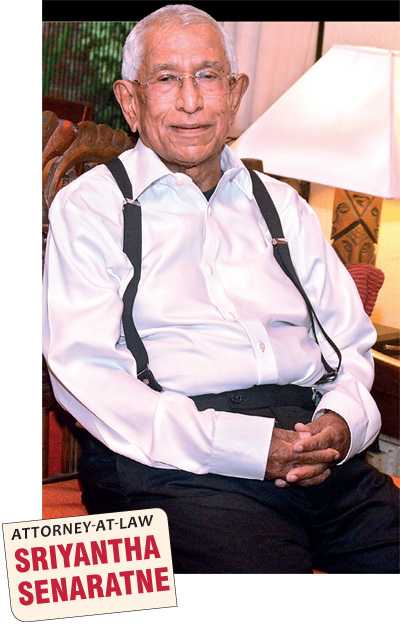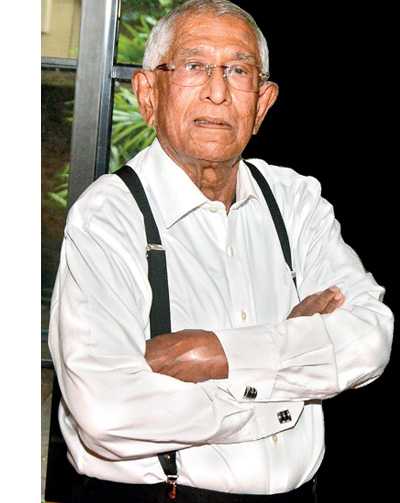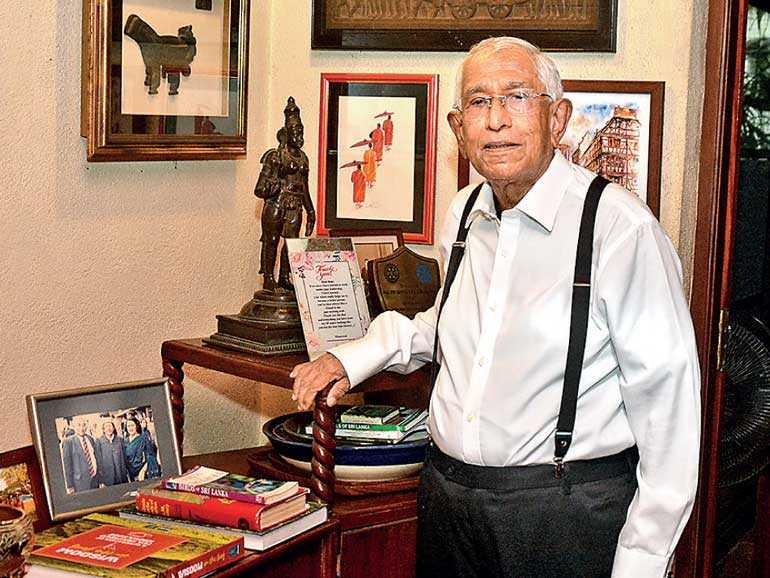Friday Feb 20, 2026
Friday Feb 20, 2026
Saturday, 8 May 2021 00:05 - - {{hitsCtrl.values.hits}}

Attorney-at-Law Sriyantha Senaratne
By Madushka Balasuriya
 |
 |
Usually a personality feature focuses on one aspect of an individual’s life, but sitting down to write this article, it became increasingly clear that nailing down Sriyantha Senaratne would not be quite so straightforward.
For one, what on earth do you zone in on? Actor, lawyer, activist, singer, scout – you name it, each tag fits quite comfortably. The past 20 years has seen the now 80-year-old set up his own law firm, but over 50 of those 80 years have also been spent in service to the Rotary. He has also spent time in tourism development, most notably helping setup Habarana Village, the first cottage style development in hotels.
Alongside these endeavours, he at one time held a post on the Inter-School Shakespeare Drama Competition Organising Committee, while also heading up the YMCA for a brief period. And I’m fairly certain I’m still missing out on a few things.
“Even when I look back now, I really wonder, ‘how in the world did I manage all that?’” ponders Sriyantha, as he lets out a trademark hearty laugh. “I did everything life afforded me at that time, I didn’t miss anything.”
Indeed, that seems to be Sriyantha’s mantra to life: live it to the fullest. And you only need to speak to him briefly to yourself feel emboldened to do the same. Whether it’s that infectious laugh, or the slightly mischievous glint in his eye, the charisma of the man is undeniable.
There is an early 2000s Jim Carrey comedy, ‘Yes Man,’ in which Carrey’s character embarks on a life-changing choice to say ‘yes’ to all decisions in his life. The choice affords Carrey’s protagonist a host of new opportunities and experiences, and in the process gives him a new lease on life. When you look back on Sriyantha’s life, it’s hard not to be reminded of this.
“The Rotary activity has opened many doors for me,” Sriyantha tells me. “If you manage time efficiently, I think you can do anything you want to. Even now I’m involved here with the firm, I’m involved with my church activities, I’m involved in the tea industry. At the age of 80 I know nothing about tea but I’m enjoying myself. I have an interest in something new.”
It’s this curiosity to keep learning, and searching for newer and better information and experiences, that has brought Sriyantha much of what he is most grateful for in his life, though he nevertheless places importance on his formative school years above all else.
“I owe everything to Trinity College, that’s where I was made. I joined Trinity in 1949 at the age of eight, and I went into the boarding. I Left in ’58 March after I got into Peradeniya University. I was really moulded for life there,” he says. “Everything later is just the cream; as they say, the cake was baked at Trinity.”
But getting into Trinity itself might not have happened if not for a “quirk of absolute happenstance,” as he puts it.
“My father being a teacher had wanted to send me to S. Thomas’ College. But we spoke Sinhalese at home, I had no knowledge of English at all. I was confronted with this fact when I went for the admission test with an English paper. I didn’t know what it was all about – I could do the arithmetic, but obviously I didn’t get in. Then because my father had been at Trinity for a short period, he said ‘let’s try Trinity’ and he taught me some essays.
“He made me memorise those, which I still remember! ‘I have a very good friend, he is my dog, his name is Bonso, he is black and white, I love my dog’ and when they looked at my paper they thought I was brilliant in my English.
“So I was put into the boarding, and at that time there was this funny rule where if you’re in the boarding at Trinity, you have to speak in English. If you spoke Sinhalese you were punished. Mind you this was in 1949, just after we got independence, so it was a very colonial sort of attitude. But it also had its own spirit, and the place was infused with certain values and culture that were inculcated into you.”
Once in Trinity, Sriyantha flourished. Less than a year after admittance, he had gone from barely speaking English to devouring novel after novel – a passion for reading he holds to this day, and one which has laid the foundation for much of the work he has done since.
“We are wordsmiths, we deal with words, and ensure that we stretch the language to its maximum but within the four corners of the law,” he says at one point of the advice he imparts on the juniors in his law firm.
“I tell all my clients, unless it is absolutely necessary, never, ever step into our courthouses; you will spend time, you will torture your mind, and it will go on and on, like you’ve jumped into quicksand. You’ll never get out of that, because our system is broken. The only people who will make money if you go to courts are the lawyers. Unless it’s something fundamental that you have to go to court, I say no. It is better to settle, even at a loss. Your mind will be at peace.”
It’s clear that Sriyantha holds a special place in his heart for law – despite his misgivings about the court system in Sri Lanka. Much of that is down to it offering him the clearest path yet to helping his fellow man, which has been a theme across his life.
“The last 20 years when I set up my own law firm, that was the most wonderful thing. It’s not just the contacts and building networks, that’s a different thing. But I see young people here who are building a professional career that is worthy of any that I have come across. You try to go out of your way and ensure that you leave a life in a better state than what you found.”
This desire to help whenever possible has manifested in numerous philanthropic endeavours throughout Sriyantha’s life, such as the Eastern Self-Reliant Community Awakening Organisation (ESCO) setup by him and his wife, Anthea – herself a Gratian Prize shortlisted author. ESCO seeks to help women and children out of poverty, particularly war widows.
And it’s evident that much of Sriyantha’s life has been guided by this need to give back in some way for the gifts life has afforded him. His mindset is never as clear as when I ask him about if he has any regrets; Sriyantha is acutely aware of the sacrifices his parents – both teachers – had to make to provide him the opportunities that he would proceed to grasp so wholeheartedly over the course of his life.
“I do sometimes wonder, did I really pay back in full the love and sacrifices that were made by my parents?”
Seeing how he has lived his life to date, and what he has made of it, I don’t think the answer is in any doubt.
Pix by Upul Abayasekara
